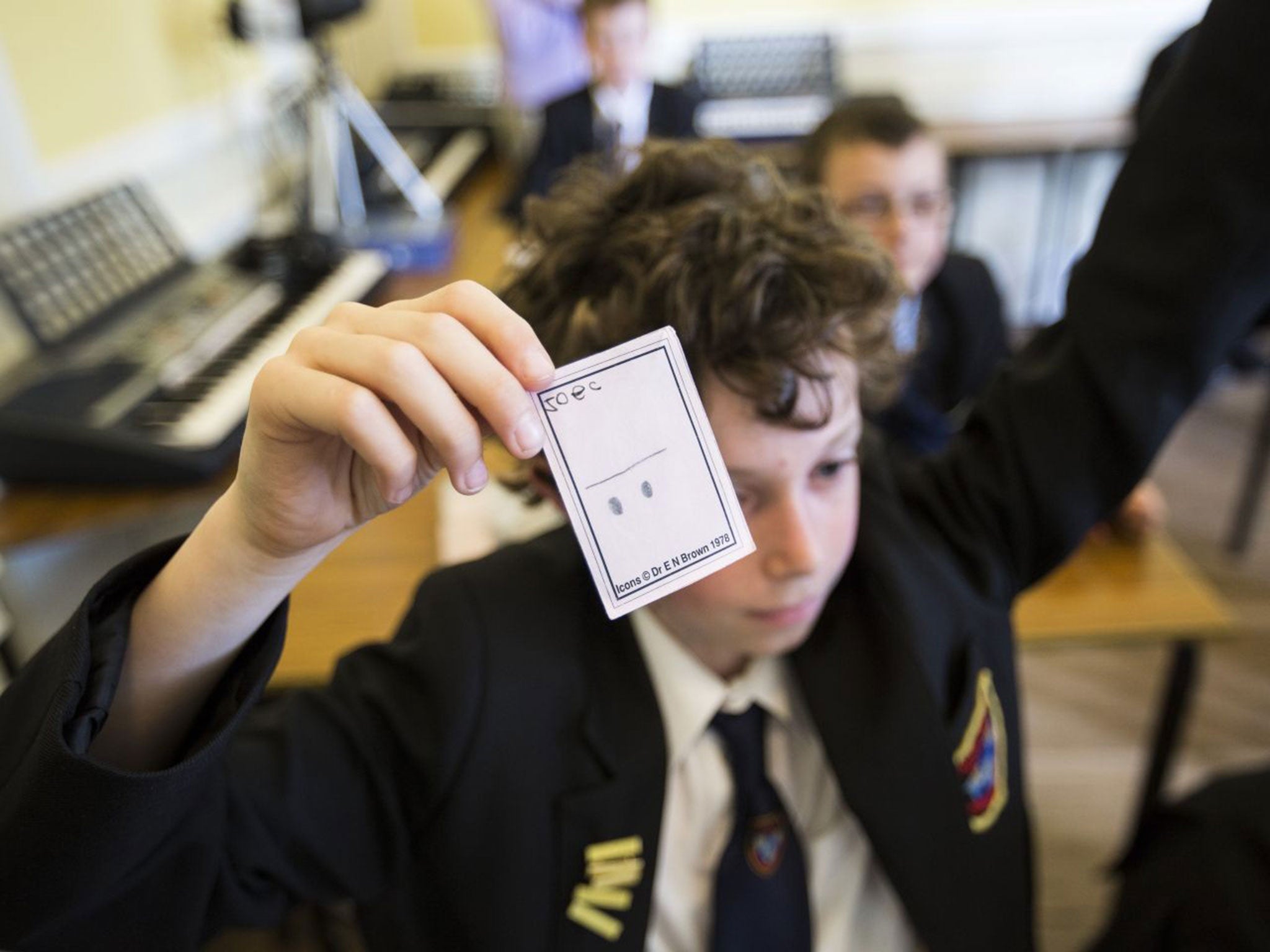College for dyslexic pupils uses flashcard system to teach literacy
'If they had stayed in a mainstream school they would have no GCSEs,' says headteacher of Maple Hayes Hall in Lichfield

The traditional scene played out every year on GCSE results day is of girls leaping into the air clutching a brace of certificates revealing untold A* passes. Invariably the school featured has produced a record pass rate. There are schools, though, whose lesser achievements arguably merit more celebration. Take Maple Hayes Hall in Lichfield, Staffordshire.
It teaches 200 seven- to 17-year-olds and, in the 30 years it has been open, it has won plaudits for the way it has helped dyslexic pupils to overcome their struggles to read and write.
"If these children had stayed in their mainstream school, they would probably have got no GCSEs whatsoever," said Daryl Brown, the school's head and son of the founder, psychologist Dr Neville Brown.
Yet the school is expecting to get around 30 per cent of its pupils to record five GCSE passes including maths and English when results are announced next month – as it has in past years. Many of its pupils have gone on to university and followed professional careers. Its proudest record is that not one of them has joined the "Neets" (not in education, employment or training) statistics during a time when youth unemployment has been at a record high.
Some of the school's pupils come to it because they are floundering in a mainstream secondary school – unable to access the curriculum and bullied as a result of it. "They can easily switch off school altogether," Mr Brown said.
At Maple Hayes Hall, they are subjected to a unique approach for curing illiteracy. "In the mainstream school, if you're struggling, it's a case of teaching phonics better – even though it is phonics that has led the pupil to being where they are in the first place," he added. "Also there is one-to-one teaching, which can be effective but it can single them out." That can lead to them being stigmatised.
At the school, they follow a staple academic curriculum of English, maths, science, geography, history, design and technology, art and design and IT. Students can do a half GCSE in music or religious education as well. The list almost tallies with former education secretary Michael Gove's own list of requirements for his English Baccalaureate – designed to ensure improved academic standards throughout the sector. "No dumbed-down subjects here," said Neville Brown.
"The point is," added his son, "that if you send them down a GNVQ route at GCSE level, it will mark them out on a particular ladder and close certain career paths to them. We don't want to do that. Our expectation is that they will improve their literacy."
Maple Hayes Hall teaches literacy through remembering icons. In one lesson, there is the image of a straight line with two dots underneath it on the board. It represents someone looking at something – summed up as "vis" for the pupil to commit memory. You can then add to it a second icon represented by three decreasing circles which they are told represents "ion" – so match the two together and you get "vision". It seems to work – the pupils remember the icons and are very enthusiastic about learning this way.
Education standards watchdog Ofsted – the school insists on Ofsted inspections rather than by the independent schools inspectorate because it believes they are tougher – is full of praise. It's last report said the school "provides an outstanding quality of education" and its "unique approach to teaching literacy skills and excellent teaching" enabled pupils to make "outstanding progress".
Despite its success, many of the pupils' parents struggle to convince local authorities the school is the right place for their children.
Some authorities are put off by the cost. In other cases, where local authorities do not have the right provision, the cost can be higher in the long term if the student stays in a mainstream school, as they could play truant, get in with the wrong crowd and end up as a burden on the state.
For the children, being stuck in a school where you cannot learn is a nightmare. Adrian Packard, whose 11-year-old daughter, Lois, starts in September, said: "It's a lot better now the end goal is in sight – but she stopped eating, became quite desperate and anxious. I went to a couple of parents' evenings [at her previous school] and they just said: 'Well, she'll catch up in time'."
Ken Upton, whose 11-year-old daughter, Sophie, started last November, is still awaiting the outcome of an appeal to determine whether the local authority will pay for her place. At present, it is being financed by a charity, but that funding has run out. He is prepared to sell his house to keep Sophie at the school, so convinced is he that it provides a solution for her literacy struggles.
"It has been a terrible, terrible ordeal [to secure a place]," he said. "The school has been absolutely fantastic. We must all [the parents] sound like a broken record, but she is a completely different child to what she was previously.
"She has grown in confidence and she is enjoying learning again – or possibly enjoying it for the first time."
Subscribe to Independent Premium to bookmark this article
Want to bookmark your favourite articles and stories to read or reference later? Start your Independent Premium subscription today.

Join our commenting forum
Join thought-provoking conversations, follow other Independent readers and see their replies